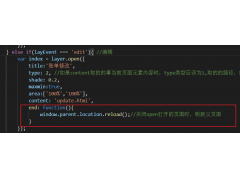What#39;s the difference between using quot;letquot; and quot;varquot;?(使用“let有什么区别?和“var?)
问题描述
ECMAScript 6 introduced the let statement.
I've heard that it's described as a local variable, but I'm still not quite sure how it behaves differently than the var keyword.
What are the differences?. When should let be used instead of var?
Scoping rules
The main difference is scoping rules. Variables declared by var keyword are scoped to the immediate function body (hence the function scope) while let variables are scoped to the immediate enclosing block denoted by { } (hence the block scope).
function run() {
var foo = "Foo";
let bar = "Bar";
console.log(foo, bar); // Foo Bar
{
var moo = "Mooo"
let baz = "Bazz";
console.log(moo, baz); // Mooo Bazz
}
console.log(moo); // Mooo
console.log(baz); // ReferenceError
}
run();
The reason why let keyword was introduced to the language was function scope is confusing and was one of the main sources of bugs in JavaScript.
Take a look at this example from another Stack Overflow question:
var funcs = [];
// let's create 3 functions
for (var i = 0; i < 3; i++) {
// and store them in funcs
funcs[i] = function() {
// each should log its value.
console.log("My value: " + i);
};
}
for (var j = 0; j < 3; j++) {
// and now let's run each one to see
funcs[j]();
}
My value: 3 was output to console each time funcs[j](); was invoked since anonymous functions were bound to the same variable.
People had to create immediately invoked functions to capture correct values from the loops but that was also hairy.
Hoisting
While variables declared with var keyword are hoisted (initialized with undefined before the code is run) which means they are accessible in their enclosing scope even before they are declared:
function run() {
console.log(foo); // undefined
var foo = "Foo";
console.log(foo); // Foo
}
run();
let variables are not initialized until their definition is evaluated. Accessing them before the initialization results in a ReferenceError. The variable is said to be in "temporal dead zone" from the start of the block until the initialization is processed.
function checkHoisting() {
console.log(foo); // ReferenceError
let foo = "Foo";
console.log(foo); // Foo
}
checkHoisting();
Creating global object property
At the top level, let, unlike var, does not create a property on the global object:
var foo = "Foo"; // globally scoped
let bar = "Bar"; // not allowed to be globally scoped
console.log(window.foo); // Foo
console.log(window.bar); // undefined
Redeclaration
In strict mode, var will let you re-declare the same variable in the same scope while let raises a SyntaxError.
'use strict';
var foo = "foo1";
var foo = "foo2"; // No problem, 'foo1' is replaced with 'foo2'.
let bar = "bar1";
let bar = "bar2"; // SyntaxError: Identifier 'bar' has already been declared
这篇关于使用“let"有什么区别?和“var"?的文章就介绍到这了,希望我们推荐的答案对大家有所帮助,也希望大家多多支持编程学习网!
本文标题为:使用“let"有什么区别?和“var"?


- 从原点悬停时触发 translateY() 2022-01-01
- 我不能使用 json 使用 react 向我的 web api 发出 Post 请求 2022-01-01
- 在不使用循环的情况下查找数字数组中的一项 2022-01-01
- 为什么悬停在委托事件处理程序中不起作用? 2022-01-01
- 为什么我的页面无法在 Github 上加载? 2022-01-01
- 是否可以将标志传递给 Gulp 以使其以不同的方式 2022-01-01
- 如何显示带有换行符的文本标签? 2022-01-01
- 如何向 ipc 渲染器发送添加回调 2022-01-01
- 如何调试 CSS/Javascript 悬停问题 2022-01-01
- 使用 iframe URL 的 jQuery UI 对话框 2022-01-01









